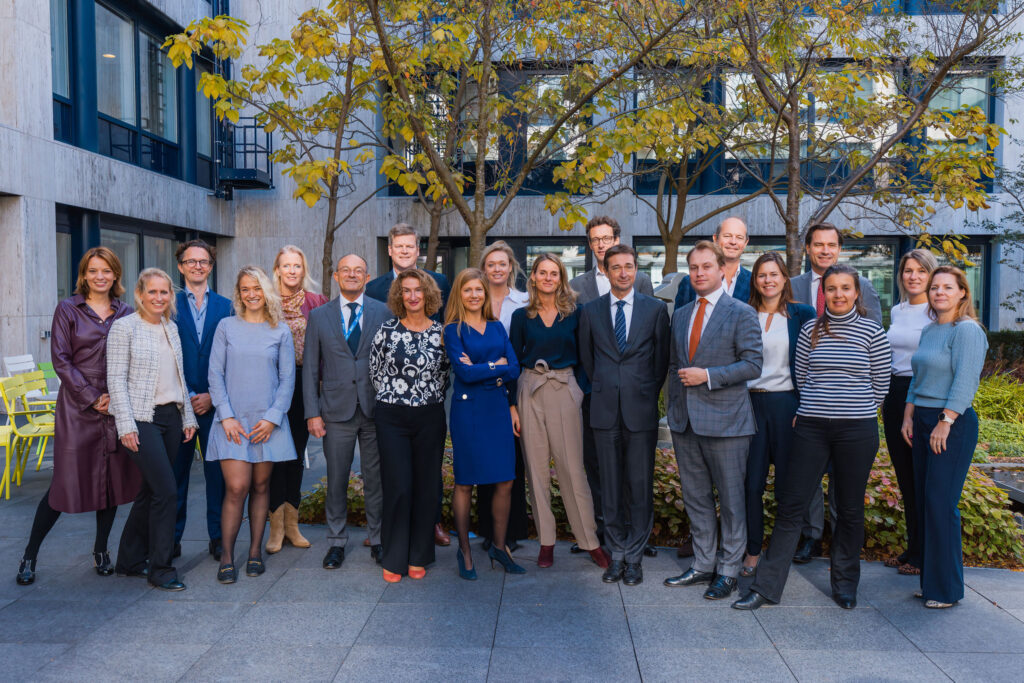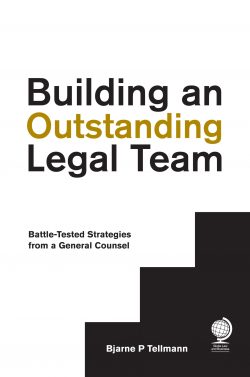This year’s General Counsel Fall Conference was hosted at AEGON’s headquarters. The conference commenced with a panel discussion discussing the twelve most notable results obtained through the just published General Counsel NL Benchmark Survey 2022. This year’s GC panel consisted of four discussants, each having their own expertise, knowledge and experience with international challenges.
This year’s panel General Counsel

- Emily Barker is Head of Legal, Ethics and Compliance at Prosus Group, a global consumer internet group and one of the largest technology investment companies.
- Alexander van Liefland is General Counsel at AEGON International and has been a member of GCN since the beginning.
- Thomas Conijn is the General Counsel at Samsung Electronics Benelux. He has eight people in his team and is in charge of legal and compliance. Recently, Thomas also became responsible for public affairs. This requires a lot of new knowledge and means many new challenges for him and his team.
- Margreet Hoekstra is the General Counsel at T-Mobile Netherlands. She is in charge of both Legal Regulatory Affairs and Compliance.
During the panel discussion topics like budgeting, the war on talent, an increase in workload, department capacity and how GCs can be on top of all the international challenges and opportunities were discussed. To summarize, legal costs are expected to increase. According to Alexander and Margreet, this could be due to the impact of more regulatory legislation and an increase in compliance costs. Also, salaries are expected to rise due to the war on talent. Emily argues securing the right people should be a top priority and the focus should be on pay for performance and paying your best people for what they are worth. Additionally, Margreet mentioned purpose, a healthy corporate culture and recognition for your work are extremely important as well.
When looking outside of your own company, Emily and Thomas shared the vision that connecting on a personal level, understanding cultural differences and giving feedback to the people you work with are very important to make sure external service providers understand your challenges. To effectively tackle these challenges you will need sufficient capacity within your legal department, something a lot of GCs think is unsatisfactory at the moment. This can also be seen in the fact that workload is still perceived to be very heavy by the majority of GCs. Technology can be helpful and relieve this workload to some extent, but Emily mentions you need to be discerning. There are a lot of off-the-shelf solutions which are fine but hiring an external expert can save you a lot of money on software. Another solution which helps to deal with the workload pressure is peer-to-peer networking. Thomas and Margreet argued networking is very helpful as this allows for quick talks with colleague peers to get objective information on how they are doing it. Knowledge sharing and getting inspiration from each other, in combination with benchmarking, is the most important aspect of networking and can be very valuable. This demand for (new) knowledge can also be seen in the rise in interest in executive management education such as the mini-MBA provided by GCN’s General Counsel Executive Program. However, this rise in interest is contradicted by the fact that 42% of GCs do not (fully) use their personal training budgets. Thomas and Margreet explained that this is probably due to the high workload and prioritizing education over work is a very hard thing to do.
Bjarne Tellmann – General Counsel & Member Executive Team at Haleon
Luckily, this year’s keynote speaker and renowned expert on managing the challenges of a multi-national GC, Bjarne Tellmann, thought the attending GCs all about his views on and experiences with building and managing an outstanding legal team to tackle the international challenges of GCs from the perspective of a multi-national GC.
Bjarne explained the role of the GC is getting harder as globalization and innovation have forced the rise of the T-shaped leader. The GC role is changing from head lawyer to mini-CEO of an international business. This forces the GC to become an individual with deep knowledge and skills in their area of expertise, along with the ability to make connections across different disciplines. Therefore, this only further adds to the point that GCs should use their personal training budgets, and make use of those mini-MBAs because they will be needing them. Additionally, the legal landscape is becoming increasingly complex while cost pressures and demand for legal services are both going up. To deal with these changes the GCs were shown a framework, consisting of three main subjects, for building an effective legal team. The framework consists of ‘Hardware’, ‘Software’, and ‘Constants’.
Hardware deals with operational aspects such as risk, structure, budget, partners, and tech. It is important to identify core risks and map them. This allows for the creation of an international risk resilience and mitigation strategy which can be divided into a central strategy for principal legal risks and a locally led strategy for all other legal risks. When identifying the risks and coming up with such a strategy it is essential to consider the Three Golden Rules. First, beware of “groupthink”. Over time, it is easy to converge and have a consensus about what this risk is and actually missing something. Therefore, diversity is a really important component here, bringing in people from other parts of the business can be very valuable. Secondly, risk is like a river. Risk does not stagnate, so you need to manage it on a day-by-day basis in terms of what your risks are. Finally, connect the dots, there are no artificial boundaries thus making the legal landscape increasingly complex.
Once you have established risk, you can then start to look at your organizational structure. Simply put, you have three categories of people in your team. You have specialists who are focusing on those principal risks, generalists who are in the field and attacking everything and you have legal operations experts, people who are really thinking about technology, strategy, budget, etc. . It is very valuable to have a unified reporting structure. Try to align your reporting structure with the organization’s structure but, fight for an integrated, unitary global function considering a unitary budget is important.
Once you have sorted your risk profile, and you have organized your team, you then want to think about your external partners. Really think about strategically procuring your law firm partnerships. Analyze, think about KPIs and track metrics to select through a structured process. Alternative legal service providers (ALSPs) are also a solid option as they allow for immediate skill allocation when dialing up or down.
Software, the second subject in the framework, deals with the ‘softer’ aspects like culture, leadership, and people. Culture can be seen as the values and beliefs that drive behaviour. Managing this is a challenge internationally because in any culture you have sub-cultures. Each of these is different, you want to get under it by really understanding how you shape that. In an existing organization you need to work with what you have and work within the core values of your company, so do not try to tear down the culture but try to shape the culture based on the beliefs and the systems that people have. Once you have established the desired culture you need to make your culture “sticky”. To do so, hire, fire, and promote based on this culture.
Leadership skills are sort of another bucket. An international leader should be an innately curious individual as knowledge grows very quickly these days and you need constant learners, people who import and export ideas. International leaders need to be great communicators, people who can tell stories because that’s how our brains are wired and can influence how people feel. Additionally, great leaders need cultural intelligence as it significantly impacts global team success. Culture determines the way people approach certain values, trust for example. In the Netherlands trust would be task-based, if you are the leading expert in M&A law, I trust you. But there are other countries, many Asian countries, Saudi Arabia, and Nigeria, where personal relationships are actually really important and when you do not build those relationships in advance then you will not have that level of trust. Another thing to watch out for is directness. The Dutch are very direct, something that would not work in, for example, Japan. In these countries, directness can sometimes be perceived as insulting. Understanding culture can be hard but can be handled by establishing cross-border working groups and making sure you spend time in the field and learn how things are going.
Now that we have gone through the hard and soft work. Lastly, Constants refer to the importance of strategy and change management. It is important to spend time with your team, really understanding what it is you do, why you exist and how you can help the company achieve its vision and purpose. This gives you clear direction, helps you prioritize and clarifies what your unique attributes are.
Succinctly, it’s a complex world, made even more complex by the international overlay and technology. You want to approach it by focusing first on your ‘hardware’, second on your ‘software’ and third, managing and paying attention to the ‘constants’.
The 12 GCN Roundtables

With this in mind, the attending GCs continued to the 12 GCN Roundtables. This year’s topics:
International disputes: the importance of information
- How to deal with inclusiveness and diversity in international business
- Impact international developments on ongoing contracts
- Supply chain management & Due Diligence obligation: major new European legislation on the way: Corporate Sustanability Due Diligence Directive
- How to get the best out of your Global Legal Team: effective reporting structure, recruitment (D&I), retention
- Evolution of work – an opportunity to refocus
- Scaling Legal department service delivery: what, why, how
- The impact of current geopolitics on compliance with recent changes in competition and trade law
- Sanctions and contracts. Between a rock and a hard place?
- An efficient international M&A & DD: with whom, how and to what limit?
- Minimalist contracting or thumb-thick contracts: Which do you choose?
- Doing well & doing good
After the General Counsel Roundtables, it was time for some snacks and drinks during the GCN Drinks & Networking. All in all, it was a successful day. We would like to thank all attending GCs for their presence, AEGON and especially Alexander van Liefland for hosting the conference and all the moderators of the GCN Roundtables, both GC and experts from our GCN Partners for their cooperation. The upcoming General Counsel NL Annual Conference 2023 will be on March 30th, 2023: we hope to see you there!
key note: bjarne p. tellmann
Bjarne Tellmann’s book “Building an outstanding Legal Team” can be found here.
Bjarne Tellmann’s slides which were used at the conference can be downloaded here (please do not distribute these slides externally and use it only personally].
Photo impression of the day
All pictures can be found and downloaded here.

